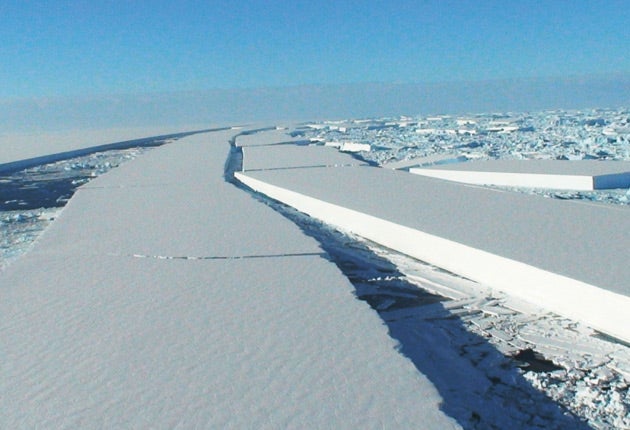Melting ice could cause gravity shift
Northern hemisphere sea levels 'will rise the most' if Antarctic sheet disintegrates

The melting of one of the world's largest ice sheets would alter the Earth's field of gravity and even its rotation in space so much that it would cause sea levels along some coasts to rise faster than the global average, scientists said yesterday.
The rise in sea levels would be highest on the west and east coasts of North America where increases of 25 per cent more than the global average would cause catastrophic flooding in cities such as New York, Washington DC and San Francisco.
A study into how the West Antarctic Ice Sheet could respond to global warming has found its disintegration would change the focus of the planet's gravitational field, so sea levels would rise disproportionately more around North America than in other parts of the world. If the ice sheet covering West Antarctica disappears, the loss of so much mass from the southern hemisphere would effectively make the pull of gravity stronger in the northern hemisphere, affecting the spin of the Earth and causing sea levels to rise higher here than in the south, where the mass of ice is currently located.
However, the scientists also estimated that the global average sea level would not rise as much as previously expected due to the ice sheet melting into the oceans.
This is because parts of the ice sheet are more stable than previously thought, and so would probably not slip into the sea even in a warmer world caused by man-made emissions of greenhouse gases, they found.
The West Antarctic Ice Sheet – one of the three great ice sheets of the world – is often referred to as the "sleeping giant" because it is believed to be inherently unstable, given much of its base rests on rock that is below sea level. This is thought to make it vulnerable to melting and relatively rapid disintegration, said Professor Jonathan Bamber of Bristol University.
"Unlike the world's other major ice sheets – the East Antarctic Ice Sheet and the Greenland – the West Antarctic Ice Sheet is the only one with such an unstable configuration," Professor Bamber said.
"There's a vast body of research that's looked at the likelihood of an ice sheet collapse and what implications such a catastrophic event would have for the globe. But all of these studies have assumed a five- or six-metre [16ft to 20ft] contribution to sea level rise. Our calculations show those estimates are much too large, even on a 1,000-year timescale," he said.
A better approximation, according to a study published in the journal Science, is that the ice sheet would contribute about 11 feet (3.3 metres) to the global average sea level.
However, it is not known how fast the ice sheet might disappear if global temperatures continue to rise, although many scientists believe this would take at least 500 or even 1,000 years.
"The pattern of sea level rise is independent of how fast or how much of the ice sheet collapses. Even if it contributed only a metre of sea level rise over many years, sea levels along North America's shorelines would still increase 25 per cent more than the global average," said Professor Bamber.
With less mass at the South Pole, and more water in the oceans, the Earth's gravity field would weaken in the southern hemisphere and strengthen in the northern hemisphere, causing water to pile up in the northern oceans, Professor Bamber said.
This redistribution of mass would also affect the Earth's rotation, which in turn would cause water to build up along the North American continent and in the Indian Ocean, Professor Bamber added.
Why the sea isn't as flat as you think
* Sea levels around the world vary widely on a daily basis because of tides caused by the gravitational influence of the Moon. They also vary from one region to another because of the variations in the Earth's field of gravity, and the spin of the planet of its axis of rotation.
* Global average sea levels can vary over time because of the thermal expansion of the sea caused by global warming, as well as the effect of rising sea levels caused by melting ice sheets and glaciers. Local sea levels can also be affected by land sinking or rising. Land sinking is partly responsible for causing sea levels in the south east of England to rise.
Join our commenting forum
Join thought-provoking conversations, follow other Independent readers and see their replies
Comments
Bookmark popover
Removed from bookmarks